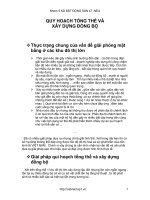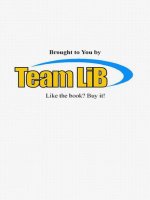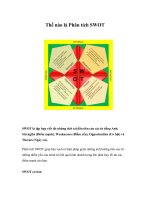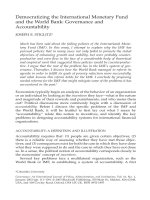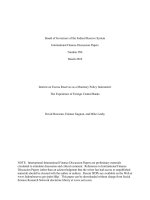The.1-2-3.Money.Plan.Oct.2010_14 ppt
Bạn đang xem bản rút gọn của tài liệu. Xem và tải ngay bản đầy đủ của tài liệu tại đây (427.04 KB, 21 trang )
ptg
This is important: All that said, there are many good
commission-based financial advisers that would do a
fantastic job for you. I just think the built-in conflict of
interest is too important to overlook. Conversely, just
because an adviser is fee-only doesn’t mean he or she is
any good.
Once you have a short list of fee-only advisers,
schedule an in-person interview, which should be free of
charge. That might seem time consuming, but it’s
worthwhile. Come prepared with your financial infor-
mation, such as how much income you have and all
your investment balances.
As you set out to choose an adviser, think about
what specific help you need. Do you feel helpless in
choosing mutual funds? Don’t know what to do with
stock options you received at work? Are you worried
you don’t have the right insurances or financial docu-
ments, such as a will, living will, and medical power of
attorney? Do you need advice on spending an inheri-
tance? Do you want a comprehensive plan to cover all
aspects of your money life?
Before setting up the interview, make sure the plan-
ner hasn’t been in trouble. Find out about disciplinary
actions by going to the U.S. Securities and Exchange
Commission Web site at www.sec.gov or calling 1-800-
SEC-0330. Look for a link like “Check Out Brokers &
Advisers.” You can also contact your state agency that
oversees investment advisers. For advisers who sell
investments, otherwise known as stockbrokers, you can
conduct a BrokerCheck at the FINRA Web site,
brokercheck.finra.org, or call 1-800-289-9999.
255
How to Save Money
From the Library of Wow! eBook
ptg
2. Ask Questions and Listen to Your Gut
Choosing the right adviser breaks down into three basic
tasks: Assessing the adviser’s technical competence,
trustworthiness, and compatibility with you. Here are
six questions that will help you judge an adviser,
whether they are fee-only or not:
● How are you paid? This might be an uncomfort-
able question to ask. But it is fundamental and
important. If you’re using a fee-only planner, the
answers should be straightforward. Ask the plan-
ner for his or her Form ADV, a document that
describes the fee structure.
● What are your qualifications? Choose a planner
who has been in the business for several years and
has a certification, such as Certified Financial
Planner or CFP. (See sidebar for other certifica-
tions.) Ask about work history.
256
The 1-2-3 Money Plan
ABCs of Financial Certifications
The financial services industry has an alphabet
soup of acronyms that represent certifications
for financial advisers. Unfortunately, none
assures you of a competent or ethical adviser.
Designations are awarded by private organiza-
tions that don’t answer to government regula-
tors. However, an official designation after an
adviser’s name at least signals he or she proba-
bly passed a test of basic financial concepts and
is staying current on changes. The following are
a few of the more meaningful certifications:
From the Library of Wow! eBook
ptg
257
How to Save Money
● CFP: Certified Financial Planner. Among the
most popular of financial planning certifica-
tions, CFPs must have at least five years of
planning experience or a bachelor’s degree
plus three years of financial planning experi-
ence. They must also complete a five-course
program, pass a 10-hour comprehensive
exam, complete 30 hours of continuing edu-
cation every two years, and adhere to ethics
standards.
● ChFC: Chartered Financial Consultant.
ChFCs must complete three more courses
than the CFPs but only have to pass individ-
ual topic exams, not a comprehensive exam.
They must have three years of experience in
the financial services industry and adhere to
ethical standards. They must also complete
30 hours of continuing education every two
years.
● CFA: Chartered Financial Analyst. A designa-
tion geared more toward the specialty of
investing and portfolio management than
broader areas of personal finance. CFAs must
pass three rigorous exams covering econom-
ics, financial accounting, portfolio manage-
ment, securities analysis, and ethics, and have
approved work experience.
From the Library of Wow! eBook
ptg
● What is your financial planning philosophy?
Here, you’re fishing for a comfort level. The
adviser should talk about his or her planning
process and not about hot stocks or unusual
investments. If a prospective financial adviser says
he or she can beat the market and promises big
investment returns, end the meeting. Nobody can
predict market movements. The adviser is either a
fool or a liar, and probably a cheat. A good finan-
cial adviser will make sure you’re well-diversified,
so you can limit risk and maximize returns.
As the adviser explains his or her philosophy, ask
yourself: Are you being coached or sold to? And
get a feel for how rushed the adviser is. If he or she
doesn’t have time to attract you as a client, the
adviser might not have time for you after you
become one. Finally, note the words and tone the
adviser uses. Is he or she speaking in financial
258
The 1-2-3 Money Plan
● CPA-PFS: Certified Public Accountant-
Personal Financial Specialist. The PFS desig-
nation is awarded to CPAs who have a
minimum of 1,400 hours of financial plan-
ning business experience, completed continu-
ing education within the last five years,
passed an exam, and adhere to a code of
ethics.
For brief information on other designations, go
online to Finra.org and click “Investor Infor-
mation,” then “Professional Designations.”
From the Library of Wow! eBook
ptg
jargon, knowing you won’t understand? It actu-
ally takes greater skill and knowledge to explain
things simply. Is the tone condescending or
supportive?
● What services do you offer? If you need a broad
spectrum of advice, make sure the planner can
help with insurance, tax planning, investments,
estate planning, and retirement planning. This is
the time to ask whether the adviser will be the
only person you deal with, or whether you’ll be
shuffled off to a junior associate. And ask about
how the adviser will communicate, by e-mail or
phone, for example. Will you receive regular
reports and periodic reviews about your financial
status?
● Tell me about your typical client. You want an
adviser accustomed to working with people like
you. If the adviser typically works with multimil-
lionaires and you have total assets of $100,000,
how much attention do you think you’ll get? You
should also ask for a sample financial plan for a
client in similar circumstances to yours—with the
client’s name removed, of course.
● Can I contact referrals? Granted, an adviser is
only going to refer you to his happy clients. Ask
the client, “If you had to do it again, would you
pick this planner?” and “What is the downside of
working with this planner?”
You want to gather factual information, but trust
your gut, too. That doesn’t mean you should judge
whether you like the adviser as a person or whether you
hit it off in idle chitchat. That’s irrelevant. This is a busi-
ness relationship, not a personal one.
259
How to Save Money
From the Library of Wow! eBook
ptg
Although some people are more gullible than others,
your gut should guide you, especially if you go into the
meeting with a bit of skepticism. It will tell you if the
adviser is being evasive or is snowing you.
3. Never Agree to an Investment You Don’t
Understand
If you can’t explain it to your teenager or your elderly
mother, don’t do it.
This is a great rule because it can keep you out of
harm’s way. For example, there are few average
Americans who can thoroughly and accurately explain
what a variable annuity is. They’re wildly complicated.
And that works out fine. They’re not good investments
for most people anyway.
That’s not to say you shouldn’t endeavor to learn
more about finance basics. You shouldn’t shy away
from stock mutual funds because you’re not quite cer-
tain what they are.
There are many good resources for investing basics,
including books and Web sites. One free resource is at
the Los Angeles Times newspaper Web site. It has a
“Money Library” with a host of finance topics, includ-
ing investing. It’s at www.latimes.com.
All this due diligence in hiring a financial planner
might seem daunting, but don’t let it deter you from get-
ting the help you need. Starting on the right financial
track, even using a mediocre but ethical planner, is bet-
ter than doing nothing. And remember, you can always
switch financial advisers later.
260
The 1-2-3 Money Plan
From the Library of Wow! eBook
ptg
Endnotes
1. On October 3, 2008, Congress temporarily
increased FDIC deposit insurance from $100,000 to
$250,000 per depositor through December 31,
2009. As of this writing, it is uncertain whether the
raised limit will become permanent. Learn more at
www.fdic.gov.
261
How to Save Money
From the Library of Wow! eBook
ptg
This page intentionally left blank
From the Library of Wow! eBook
ptg
Succeeding with Money
I
n the introduction of this book, I promised to help
you navigate the world of spending and saving
money. I said this book would be like a GPS device
that helps you with driving directions. I wanted to get
you from here to there safely and with the fewest has-
sles.
I’ve touched on the vast majority of money issues
that you will probably encounter in your life. Did I
cover every detail of every money topic? No. Few books
do. And I didn’t even try.
What I wanted to do is to make money simple. I did
that by breaking down common money topics to their
three most-important tasks. I gave you very specific
advice. And granted, it might not be the absolute best
advice you could possibly receive. But it’s darned fine
advice for almost everybody. It nudges you toward
money decisions that are “good enough.” That allows
you to make money decisions and get on with your life.
You can take comfort in the fact that you’re doing smart
things with your hard-earned cash.
263
Chapter 8
Putting It All Together
From the Library of Wow! eBook
ptg
We even had some fun along the way. What other
personal finance book tells you how to make razor
blades last longer, how to get the best deals on video
cables, and how to spend $20 a year on phone service?
I hope you’ll go through the topics in this book and
methodically address each area of your money life—
after all, each contains just three steps.
Throughout this book, I used a 1-2-3 format, which
defined tasks for each money topic. But what if I were
to give you just one more 1-2-3 list? This would be a
super–Cliff Notes version. It would be three steps to
succeeding with money.
If you did nothing else in this whole book, doing
these three things will give you a shot at being a finan-
cial winner.
Based on my knowledge of money topics and based
on feedback from literally thousands of readers over the
years, that list would look like the following:
264
The 1-2-3 Money Plan
Succeeding with Money, 1-2-3
1. Never buy a new car until you’re a
millionaire.
2. Buy a home that you can afford.
3. Care about spending.
I briefly mentioned cars and houses in other chap-
ters. They are the largest single purchases most people
From the Library of Wow! eBook
ptg
will make in their lifetimes. Financing for these two pur-
chases often ranks at the top of most people’s monthly
expenditures. For that reason, they are important.
But you already know that. You probably already
take great pains to be a smart consumer about vehicles
and houses. Whether you succeed is a different matter.
What you might not have contemplated is the vast
difference between buying a car and buying a house.
They impact your money life in dramatically different
ways. They are different for two fundamental reasons.
The reasons are:
• The value of your vehicle is guaranteed to plum-
met. (That’s bad.)
• The value of your house almost always rises.
(That’s good.)
These might seem like terribly elementary observa-
tions. But from a bird’s-eye view overlooking the span
of your money life, there is profound wisdom in recog-
nizing these truths. Is the money you’re spending work-
ing for you or against you?
1. Never Buy a New Car Until
You’re a Millio naire
Get-out-of-debt guru Dave Ramsey often says this. He
has a flair for dramatic statements, and I agree with this
one, so I stole it.
If a new car costs $30,000 and it loses the standard
30 percent of its value in its first year, that depreciation
costs $9,000.
265
Putting It All Together
From the Library of Wow! eBook
ptg
Is $9,000 a lot of money in your world? If so, you
should always buy one-year-old or older cars. In other
words, don’t buy a new car until you’re a millionaire. It
doesn’t get much more complicated than that.
But car-buying isn’t that easy, is it? Confusion sets in
when you start talking about your dream car or how
low the monthly payments are or how unreliable a used
car might be. Somehow new-car smell warps our brains
and clouds the issue.
Vehicles today are more reliable than ever. Even a
three-year-old car is still a pup. Some of the reliable
family sedans with minimal maintenance go 150,000
miles without a hiccup. See Chapter 7, “How to Save
Money,” for details on setting up a car fund to save
enough to pay cash for your next vehicle.
266
The 1-2-3 Money Plan
QUICK TIP:
Need to ease into the buying-used-cars thing? Try a
certified preowned car with a warranty from the man-
ufacturer, not the dealer or a third party. Certified cars
are more expensive than noncertified, but this might
give you the peace of mind you need to move from
buying new to buying used. By the way, isn’t “pre-
owned” a silly way to describe a used car? Preowned
literally means “before it’s owned,” or new.
2. Buy a Home That You Can Afford
Let’s split this task into two parts. The first half, “buy a
home” is a recommendation to buy a house instead of
renting.
From the Library of Wow! eBook
ptg
The value of a home comes partly from its price
appreciation. Generally, house prices increase over the
long term. The house-price bubble that started bursting
in 2006 was an exception.
Homeowners also get another kind of value, how-
ever. They don’t have to pay rent. Instead, they pay on
a mortgage, which ends up being a form of forced sav-
ings. When renters pay rent, they never see that money
again. Meanwhile, homeowners are building equity in
the property, assuming they don’t have one of those
exotic “negative amortization” loans that were all the
rage just before the housing bubble.
And if homeowners itemize their tax deductions,
they can claim their mortgage interest, which is yet
another financial benefit.
A home mortgage also provides leverage. You put
down a small fraction of the home’s worth in the form
of a down payment. But when you sell the home, you
get to keep the gain on the entire home’s value—not just
the down payment portion. For example, imagine you
bought a home for $300,000 with a 20 percent down
payment of $60,000. If you sell the house for $500,000,
you get to keep all the $200,000 gain, not just 20 per-
cent of it.
And you lock in your housing costs. Rents might rise
every year, but assuming you got a 30-year fixed-rate
mortgage, your payment will be the same for decades.
Consider this startling statistic: The average home-
owner has a net worth of nearly $200,000, while the
average renter has a net worth of less than $5,000,
according to the Federal Reserve Survey of Consumer
267
Putting It All Together
From the Library of Wow! eBook
ptg
Finances. And it’s not because homeowners have 40
times the income of renters; they only have about twice
as much.
The second half of this “buy a home” task is the
qualifier “that you can afford.” This is where so many
people messed up during the housing crisis. Because of
weirdo mortgages that artificially lowered the monthly
payment, many people bought homes they could not
afford in the long run.
One rule of affordability comes from the Federal
Housing Administration. It contends that your monthly
payment for mortgage principal and interest, plus real
estate taxes, plus homeowner’s insurance should not
exceed 29 percent of your gross income. So, if your
household income is $8,000 a month, you could afford
a total monthly payment of $2,320.
That’s fairly liberal. I might even classify that as a
“stretch” payment, meaning you’ll probably feel
pinched until your income rises over the years.
Remember, the principal-and-interest part of your
house payment stays the same with a fixed-rate mort-
gage. So, when your income rises, the payment becomes
easier to make.
If you were going to stretch to afford a house pay-
ment or a car payment, the house is the one to choose.
You can play with mortgage-affordability calcula-
tors on the Internet at such Web sites as Bankrate.com
and Dinkytown.com to hone in on a comfortable pay-
ment for you.
268
The 1-2-3 Money Plan
From the Library of Wow! eBook
ptg
3. Care about Spending
And this is what it’s all about. Remember that spending
and saving aren’t really different. Saving is just an intel-
lectual decision to spend later, rather than now. If most
people put as much time and effort into managing their
money lives as managing their weekly TV watching,
they would be far better off.
And daily spending matters. From supermarket
shopping to your phone bills to insurance. You’ll be far
wealthier if you can develop the spending smart philos-
ophy: Spend on purpose, rather than by accident and
habit. And plug the leaks of wasteful spending, so you
can funnel more money to things you truly care about.
Earning is important, but you can’t outearn dumb
spending.
So, care about all your spending, whether you’re
spending today, yesterday, or tomorrow. It’s as easy as
1-2-3.
For more information about saving and spending
smart, see my blog at SpendingSmart.net and my Web
site at www.GregKarp.com. Feel free to e-mail me at
269
Putting It All Together
From the Library of Wow! eBook
ptg
This page intentionally left blank
From the Library of Wow! eBook
ptg
271
Index
Apple, iPod, 4
Aquamira.com, 159
Arnold, Curtis E., 200
artificial scarcity plan, 217
Association for Independent
Consumer Credit Counseling
Agencies, 212
audio-video cables, 102
auto insurance, raising
deductibles, 84
autofill programs, 129
automatic bill paying, 57-60
drawbacks of, 58
automatic contribution, col-
lege savings, 250
automatically renewing serv-
ice, 122
automobiles, 22
average accumulator of
wealth (AAW), 31
B
BabyMint.com, 132
back-to-school spending, 226
balances on credit cards,
192-194
Symbols
401(k), 206, 230
rollovers, 240
402(b), 230
403(b), 206
529 college savings plans, 36,
242-247
A
AAW (average accumulator
of wealth), 31
accessing credit reports,
170-171
AccuQuote.com, 81
age-based plans, college sav-
ings, 249-250
aggressive driving,
avoiding, 147
allowances, teaching children
about money, 140-142
Amazon.com, 110
AnnualCreditReport.com,
170-171
antenna, TV, 99
AOL Yellow Pages, 120
From the Library of Wow! eBook
ptg
272
Index
banking, 47-48
checks, 52
credit unions, 54-55
fee-free cash, 52
high-interest online bank
accounts, 52-53
no-fee checking accounts,
49-51
switch kits, 51
Bankrate.com, 81, 174, 268
batteries, 157-158
bill paying, 55
automatic bill paying,
57-60
direct deposit, 56
electronic payments, 59
prioritizing in a crisis,
60-61
BillShrink.com, 199
bottled water, 159-160
brokercheck.finra.org, 255
brokers, checking, 255
budgeting, zero-based budget-
ing, 106
buying online, 124-126
commodities, 126
coupon codes, 130-131
credit cards, 128-129
eyeglasses, 133-134
rebate portals, 131-132
shipping cost versus sales
tax, 127-128
buying products, 107-108
reading reviews, 108-111
reevaluating, 113-114, 117
researching prices, 111-112
buying services, 117-118
contracts, reviewing, 124
prices, researching,
121-123
reviews and references,
seeking, 118-121
buying used, refurbished elec-
tronics, 138-139
buying used items, 134
cars, 135
evaluating price and quali-
ty, 137
getting over the “yuck”
factor, 135-136
keeping it simple, 137
C
cables for TV, 102
calculators, online
calculators, 228
call2recycle.org, 158
cancelling landline phone
service, 85-87
car funds, 224-225
carbon footprints, 161
carbon offsets, 161
CardRatings.com, 199
CardWeb.com, 194
cars, 22, 135, 265
new cars, 265-266
Cars.com, 111
cash, 182-183
From the Library of Wow! eBook
ptg
273
Index
cash back, choosing rewards
cards, 200-202
Catalinas, supermarket shop-
ping, 75
catalogchoice.org, 44
CCCS (Consumer Credit
Counseling Service), 212
cell phones. See telecommuni-
cations
certifications, financial advi-
sors, 256
Certified Financial Planner
(CFP), 257
certified preowned cars, 266
Certified Public Accountant-
Personal Financial Specialist
(CPA-PFS), 258
CFA (Chartered Financial
Analyst), 257
CFLs (compact fluorescent
lamps), 155
CFP (Certified Financial
Planner), 257
Chartered Financial Analyst
(CFA), 257
Chartered Financial
Consultant (ChFC), 257
Chatzky, Jean, 7
check cards, 184-186
check washing, 187
checking accounts
no-fee checking accounts,
49-51
rewards checking
accounts, 50
CheckingFinder.com, 51
checks, 186-187
Checksinthemail.com, 52
Checksunlimited.com, 52
CheckWorks.com, 52
cherry-picking, 72
ChFC (Chartered Financial
Consultant), 257
child life insurance, 83
children, learning about
money,
140-143
allowances, 140-142
choicetrust.com, 175
choosing
financial advisors, 256
rewards cards, 199
cash back, 200-202
chores, 141
CircleLending.com, 223
CitySearch.com, 120
CLUE (Comprehensive Loss
Underwriting
Exchange), 174
Cnet.com, 96, 111
ColemanNatural.com, 68
College Board Web site, 241
college savings, 240-242,
248-249
529 savings accounts
online, 243-247
529 savings plans, 36
age-based plans, 249-250
automatic contribu-
tions, 250
community colleges, 251
From the Library of Wow! eBook
ptg
274
Index
Diversified B, 242
prepaid tuition plans, 247
commodities, buying
online, 126
community colleges, 251
compact fluorescent lamps
(CFLs), 155
CompareRewards.com, 132
Consumer Credit Counseling
Service (CCCS), 212
Consumer Federation of
America, 83
Consumer Reports, 109
fuel economy, 148
ConsumerReports.org, 96
Consumers’ Checkbook, 118
ConsumerSearch.com,
96, 110
contracts, reviewing before
buying services, 124
control, paying attention to
spending, 18
CoolSavings.com, 74
coupon codes, shopping
online, 130-131
Couponizer, 73
CouponMom.com, 73
coupons
Catalinas, 75
food away from home, 78
matching to sales, 73-75
Coupons.com, 74
courtesy overdraft protec-
tion, 184
Coverdell Education Savings
Account
college savings, 248
CPA-PFS (Certified Public
Accountant-Personal
Financial Specialist), 258
credit, 165-168
credit ratings, 166-168
credit reports, 170
accessing, 170-171
disputing mistakes, 172
reading, 172
credit scores, 172, 174
improving, 175-180
establishing, 180-181
identity theft, 170
payment history, 181
saving money, 169
credit cards, 191-192
balances, 192-194
buying online, 128-129
fees, 198
maintaining, 196-198
perks, 195-196
raising limits, 222
rewards cards, 198
choosing, 199-202
credit counseling, 209-212
credit freezes, 46-47
credit monitoring, 41
credit ratings, 166-168
credit repair, 177
From the Library of Wow! eBook
ptg
275
Index
credit reports, 170
accessing, 170-171
disputing mistakes, 172
reading, 172
credit scores, 165, 172, 174
improving, 175-180
credit unions, 54-55
rewards cards, 199
Credit.com, 174
CreditKarma.com, 174
crosscut shredders, 43
custodial accounts, college
savings, 249
D
deadbeats, credit cards, 195
debit cards, 184-186
debt, getting out of, 203-204
credit counseling, 209-212
home equity loans, 208
mortgages, 208
pay small debts first,
206-207
quit borrowing money, 204
quit saving money, 205
debt management plans
(DMPs), 211
debt ratio, improving, 179
deductibles, raising on home
and auto insurance, 84
digital music players, 5
Dinkytown.com, 241, 268
direct deposit, bill paying, 56
discounts, food away from
home, 78
discretionary money, spend-
ing, 19
experiences, 21
things that rise in value,
21-23
things you care about,
19-21
Diversified B, 242
college savings, 249
diversifying retirement
accounts, 233-238
dmachoice.org, 44
DMPs (debt management
plans), 211
dollar stores, 136
Dominguez, Joe, 29
drawbacks of automatic bill
paying, 58
durable power of attorney for
finances and health care, 40
E
Earle, Bill, 31
Earth911.org, 156
Ebates.com, 132
eBay, 112
Edmunds.com, 111, 147
electronic payments, 59
electronics, refurbished elec-
tronics, 138-139
emergency funds, 219-223
EmigrantDirect.com, 53, 218
EnergyStar.gov, 154
Entertainment.com, 78
From the Library of Wow! eBook

